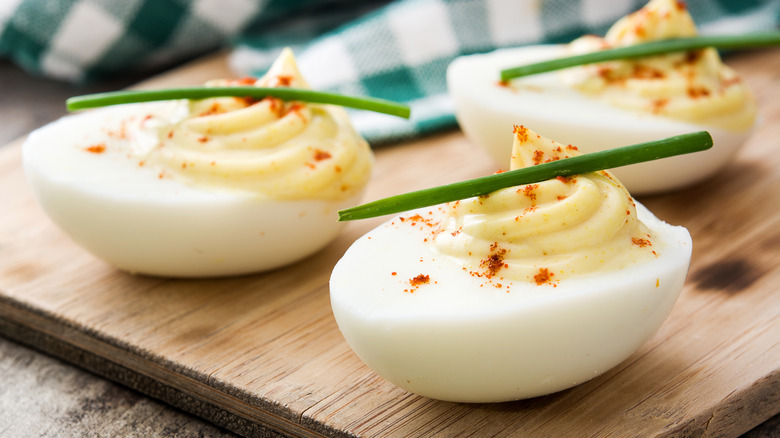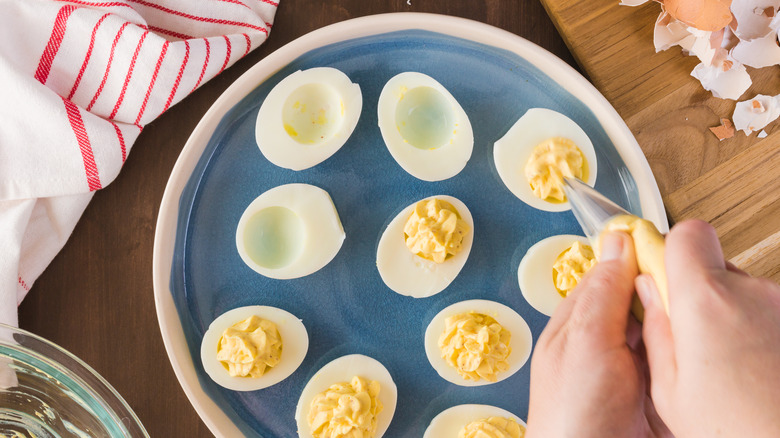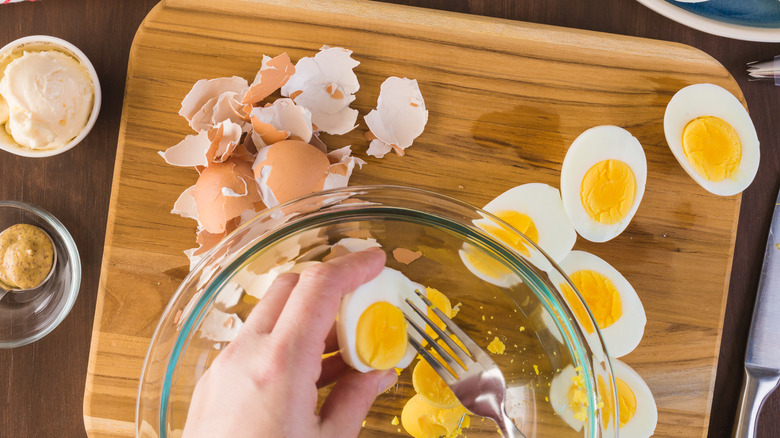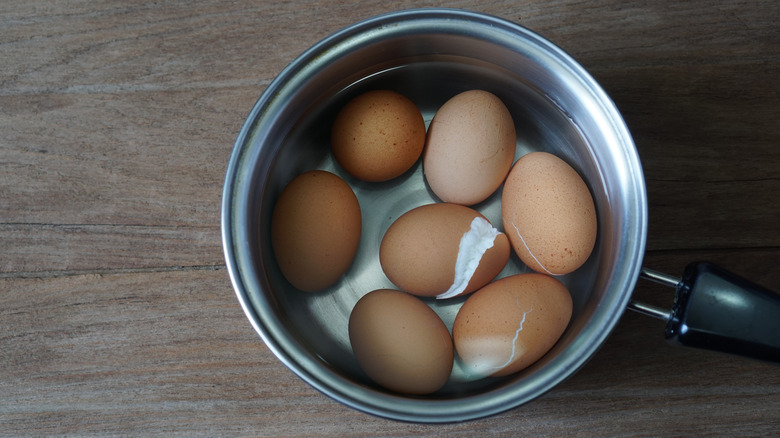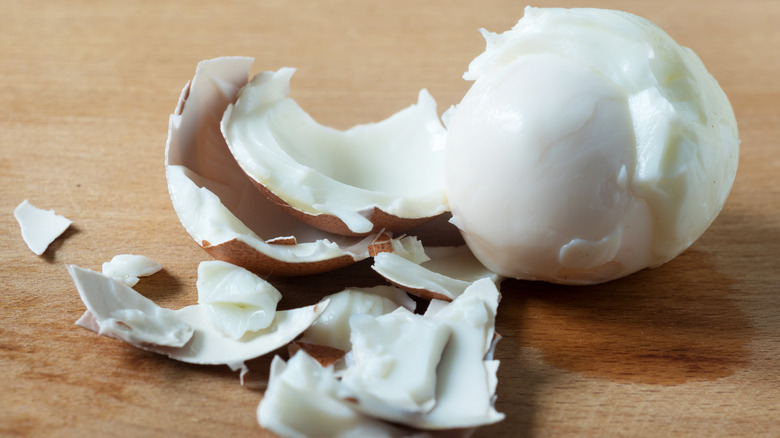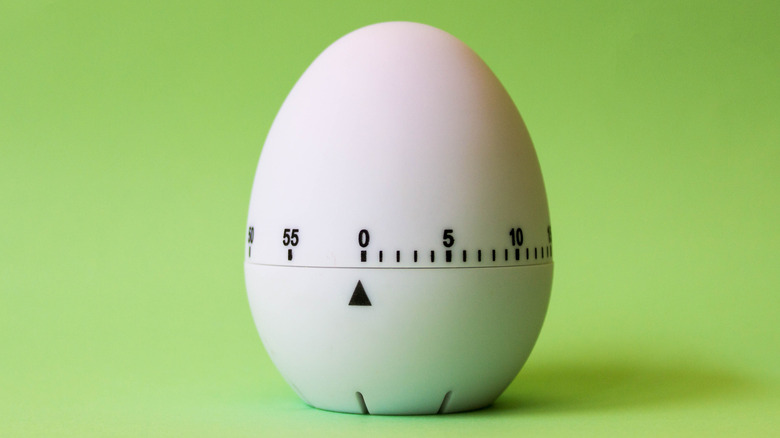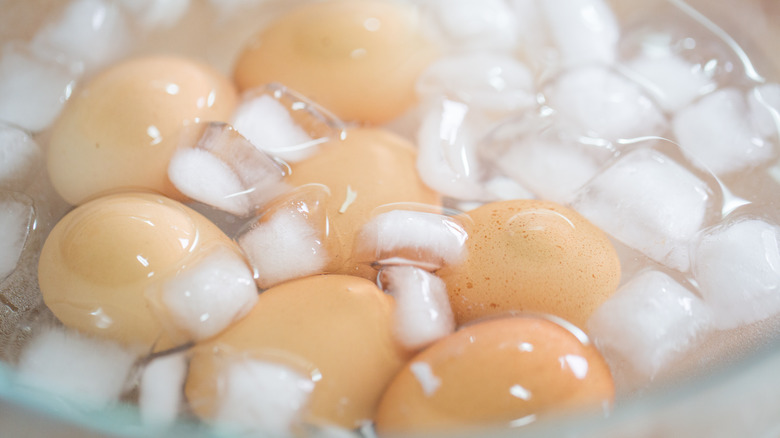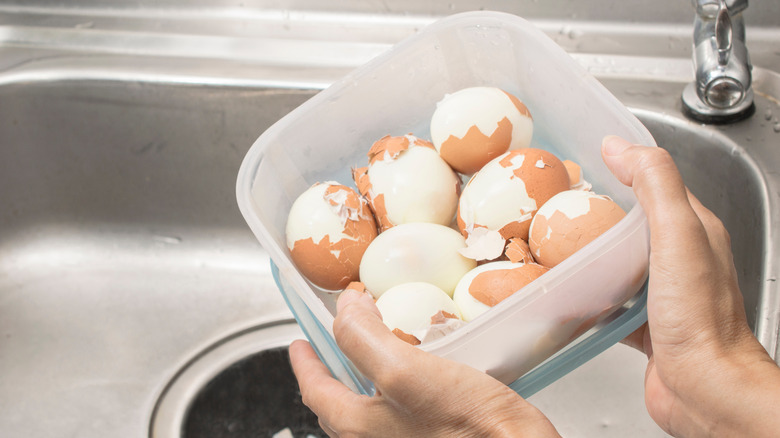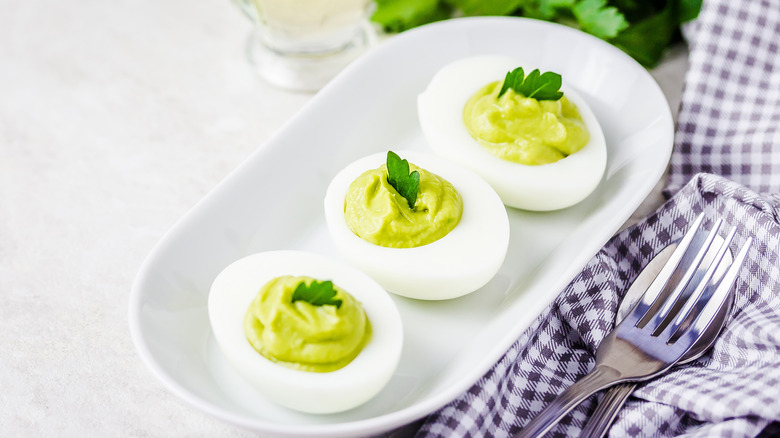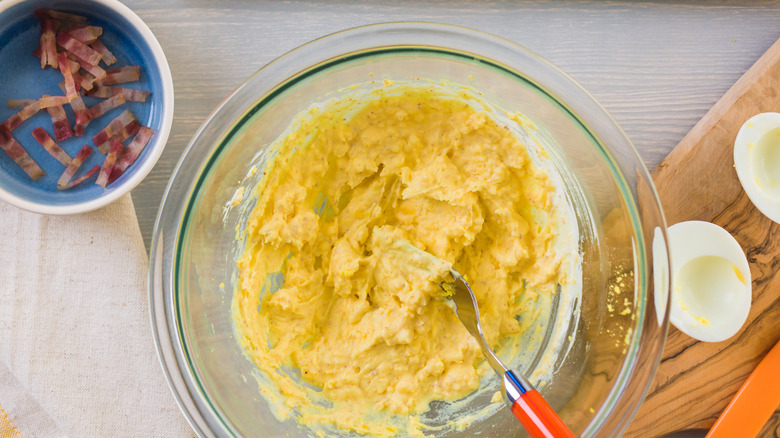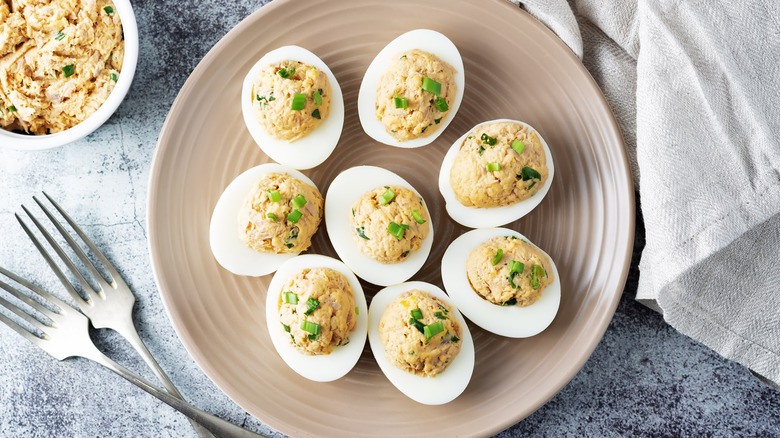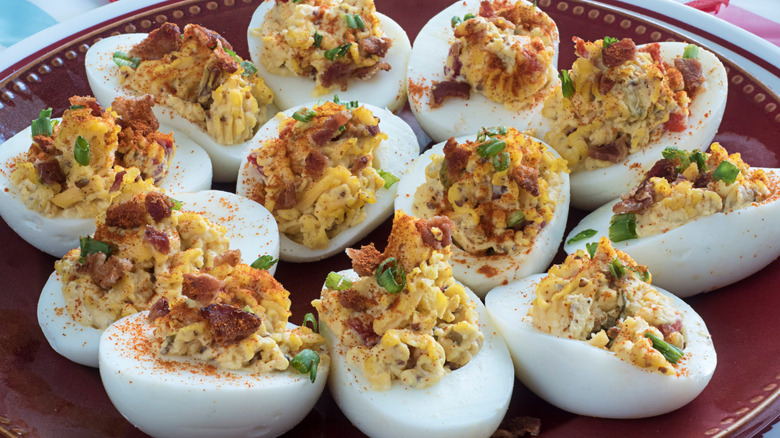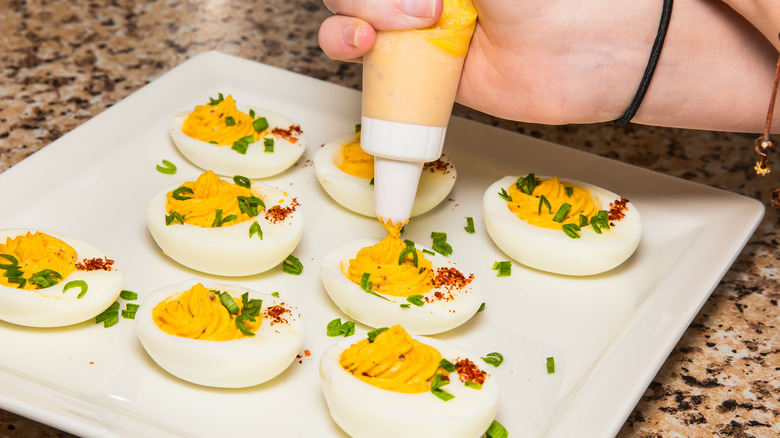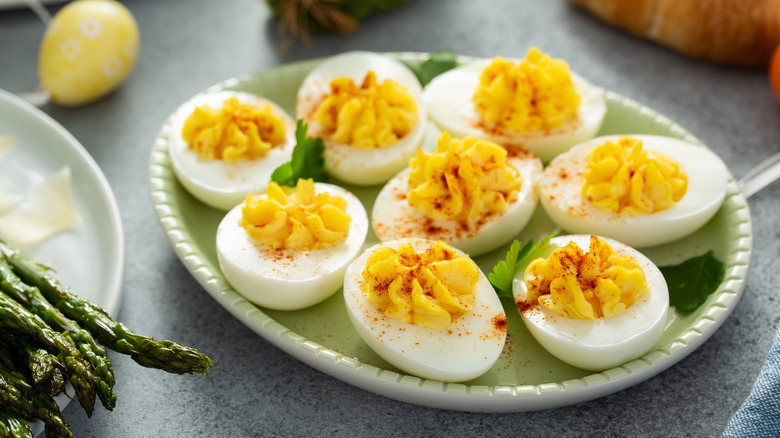Big Mistakes Everyone Makes With Deviled Eggs
Making mistakes with deviled eggs can leave you with ugly boiled eggs, eggs that don't taste as good as they should, or even eggs that can make you sick. If you follow the wrong procedure for boiling the eggs or skimp on ingredients, you're not going to end up with a treat that is as good as it could be.
Deviled eggs seem easy enough to make, but if you get one step wrong, you can easily ruin them. It's necessary to ensure your eggs are the right age, that you cook them at the right temperature for the right amount of time, and that you cool them before peeling. Learning hacks to make your eggs easy to peel is only the beginning. You'll want to try out a variety of creamy ingredients and add interesting elements to make your stuffed eggs taste their best. Then, you've got to find a way to fill them and serve them without making a mess or making anyone ill. However, we're confident you'll make perfect eggs once you've figured out what you've been doing wrong.
Using eggs that are too fresh
One of the biggest mistakes you can make with deviled eggs happens before you even get started: using eggs that are too fresh. Food scientist Harold McGee said in "On Food and Cooking" that older eggs peel easier.
McGee explained that the egg whites in fresh eggs are more acidic, which makes them stick to the shells more when you boil them. After your eggs have been in the refrigerator for a few days, the pH rises to become more alkaline (around 9.2), which makes them easier to peel. If you use fresh eggs, McGee suggested raising the alkalinity of the water in which you plan to boil them. To raise the water's alkalinity, you can add baking soda at a rate of ½ teaspoon of baking soda per quart of water. Since eggshells are porous, the alkaline water will permeate the shells to make the egg whites inside more alkaline. However, there's a downside to this method, in that your eggs will end up tasting more sulfurous.
McGee said you can also cook your eggs a little longer than usual to ensure the egg whites hold together better. And, if you refrigerate your eggs before peeling, it will give them a chance to firm up even more.
Not centering the egg yolk before boiling
There's nothing more disappointing than slicing open your boiled eggs and realizing the yolk was off-center, resulting in a fragile egg white. However, there are tricks for obtaining more symmetrical deviled eggs, including paying attention to the age and grade of the egg, storage methods, and cooking methods. While food scientist Harold McGee wrote in "On Food and Cooking" that none of these methods are "completely reliable," they're still worth a try.
McGee said that fresher, high-grade eggs have smaller air cells and thicker egg whites. Meanwhile, the egg whites in older eggs have less water, causing the yolk to float upward. While you don't want to use an extremely fresh egg for your stuffed eggs, you also don't want to use an extremely old egg either.
Chef Palak Patel from the Institute of Culinary Education told Mashed that storing eggs upside down (small side down) can help center the egg by "keeping the air pocket at the top versus the bottom." However, McGee shared that food industry studies indicate that it's best to store eggs on their sides rather than on one end or the other to keep yolks more centered. Some people also try cooking techniques to attempt more centered eggs. One involves swirling the eggs around in the pot during the first few minutes of cooking, while the other involves standing the eggs upright in the pan. You could even try an egg trivet to stand them upright.
Boiling eggs straight from the fridge
One of the mistakes you're making with deviled eggs is boiling eggs straight from the fridge. You definitely want to add your eggs to boiling water, but you shouldn't do it when the egg surface is frigid. Southern Living talked with Atlanta chef Jennifer Hill Booker, who said that adding cold eggs to boiling water creates a "violent reaction" inside the eggshell. Several things happen as a result, including the shells cracking from extreme temperature differences, the egg whites sticking to the shell, and the egg becoming "rubbery and tough."
Tennessee chef Jason Smith told Southern Living that, if you take the eggs out of the fridge when you start the water on to boil, the egg surface should be the right temperature by the time the water reaches boiling to avoid negative results. Jake Cohen from The Feedfeed says that he always places his eggs in a bowl of room temperature water for five minutes before boiling to ensure they won't crack and to achieve a "super perfect egg" (via Instagram).
Not cooking your eggs at the right temperature
Some deviled egg recipes suggest placing eggs into cold rather than heated water. However, the success rate for being able to peel them cleanly is much lower if you add them to cold water. When Serious Eats culinary consultant J. Kenji López-Alt tested boiled egg results, he found that "even with two-week-old eggs, starting cold resulted in eggs that had just over a 50% success rate for clean peeling." He added, "Eggs started in boiling water or steam came out well above 90%." He explained that a gradual temperature increase results in the egg whites sticking to the shell membrane, making them harder to peel.
In his book "On Food and Cooking," food chemistry authority Harold McGee said that you shouldn't cook eggs at a harsh, rolling boil. Instead, you want to simmer them in bubble-less water at a temperature between 180 and 190 degrees Fahrenheit. López-Alt suggests starting the eggs at boiling for half a minute to "set the exteriors of the whites" before dropping the water temperature down to between 180 and 190 degrees Fahrenheit. Not boiling the eggs also has the advantage of preventing the eggs from violently crashing against each other in tumultuous water.
Both McGee and López-Alt suggest steaming eggs above boiling water as an alternative to create more tender eggs that are less likely to crack. If you steam the eggs, you won't have to turn the temperature down to a simmer.
Not setting a timer or using a timed cooking appliance
Timing your eggs is necessary to produce perfect hard-boiled eggs with yolks and egg whites that aren't undercooked or overcooked. In "On Food and Cooking," food scientist Harold McGee said that lower cooking times result in a yolk that's still moist and pasty. However, if you cook your eggs for as long as 15 minutes, you'll end up with an egg that is dry and grainy. McGee also noted that longer cooking times release more ferrous sulfide, resulting in a green-gray yolk.
The amount of time you should boil them depends on your egg size. Chef and owner of Braised and Deglazed Devan Cameron told Mashed, "Large eggs need 12 minutes of cooking in boiling water if they're cold from the fridge, and 11 minutes if they're at room temperature. Small eggs will only need 10 minutes of boiling to be effectively hard-boiled."
Mashed recipe developer Susan Olayinka suggested the 5-5-5 method to get the perfect timing for making Instant Pot boiled eggs. The 5-5-5 method involves five minutes of high-pressure cooking, five minutes of natural steam release with the lid still on, and five minutes of cool-down in an ice water bath before peeling.
Not allowing them to cool in ice water before peeling
Despite common misconceptions, using an ice water bath doesn't actually make hard-boiled eggs easier to peel. When Serious Eats culinary consultant J. Kenji Lopez-Alt experimented with egg-boiling methods, he found that ice water shocking does result in a rounder egg without a flattened bottom or dimples.
Lopez-Alt explained his theory of why the ice water bath completes the egg-cooking process. He hypothesized that, when you add a boiling egg to ice-cold water, the shock causes the steam in the egg's air pocket to condense and create water, making the air pocket that much smaller. The egg white is still malleable, so it fills in whatever space is left in the air pocket with more uniformity.
An ice bath is also important for a perfect hard-boiled egg to stop the egg's cooking process. Not only do overcooked eggs become dry and rubbery, but food scientist Harold McGee explained in his book "On Food and Cooking" that it can create ferrous sulfide, which will result in green-gray yolks.
Not using a hack to make them easier to peel
There are several deviled egg hacks that make hard-boiled eggs easier to peel. However, some of them depend on your circumstances. Food chemist Harold McGee explained in his book "On Food and Cooking" that you should add ½ teaspoon of baking soda per quart of water to increase the egg's alkalinity and make it easier to peel if the eggs are really fresh.
However, some hacks work despite the age of the egg. For example, Serious Eats' culinary consultant J. Kenji Lopez-Alt found that it's easier to peel eggs if you place your egg directly into boiling water rather than cool water. Lopez-Alt also said that chilling your eggs overnight will make them even easier to peel than a cold water bath alone.
Cooking celebrity Gordon Ramsay's foolproof method for peeling boiled eggs suggests cracking the eggs before placing them in ice water (via YouTube). Alternately, a middle school science teacher on TikTok put eggs straight into a bowl of cold water with a lid before shaking them long enough to crack the shells. Another TikTok user recommended inserting a spoon into a crack at the wide bottom of the egg near its air pocket and using the spoon to easily remove the rest of the shell.
Limiting yourself to mayonnaise for creaminess
It's easy to get into a rut making stuffed eggs with just mayonnaise for creaminess. However, there are plenty of other options to make your yolk filling creamy either alone or combined with mayonnaise. Honestly, any creamy dairy product could work, like sour cream, crème fraîche, or creamy salad dressings. Greek yogurt is also a secret ingredient you can add that has fewer calories and fat than mayonnaise. Surprisingly, Julia Child liked to add butter to her deviled eggs (via The Takeout). Yellow mustard is always an option, but we suggest Dijon or stone-ground mustard will give it a more complex flavor.
Pat and Gina Neely, who host the Food Network's "Down Home With the Neelys," add barbecue to their deviled eggs, along with mayo, mustard, and hot sauce to kick it up a notch in flavor.
Guacamole (or just smashed avocados) is another contender for creaminess.
Adding too many wet ingredients
If you've ever accidentally added too many wet ingredients to your stuffed egg filling, you'll probably go to lengths to never do it again. When you add too many wet ingredients, you can end up making the filling too runny to stay in the hollow of the egg white. And if you add too much mayo, even the biggest mayonnaise lover is likely to find that the taste overwhelms the flavor of the yolk and other ingredients. Plus, if you're piping hot filling back into the egg halves, it will be that much more difficult to do (via Tasting Table).
Luckily, if you end up adding too many wet ingredients, you haven't made an irrevocable mistake with your deviled eggs. Pantry & Larder explained that the best way to thicken your runny deviled egg filling is to add in more egg yolks. Pantry & Larder shared that if you don't have more eggs, you can add instant mashed potatoes or xanthan gum for fairly good results. If you don't have any of these three, you can try breadcrumbs instead for mediocre results.
Making them too far ahead of time
Making deviled eggs ahead of time is possible. Of course, you and others with access to your fridge have to resist the temptation to accidentally eat them all before you plan to serve them. The FDA says that you can keep hard-boiled eggs in the fridge for up to a week (peeled or unpeeled) after you boil them. So, you can always boil the eggs up to seven days before you plan to eat them and stuff them later. However, once you've turned hard-boiled eggs into stuffed eggs, it doesn't take long before the filling starts changing consistency.
In the question and answer part of her website, cooking guru and hosting queen Ina Garten said, "For deviled eggs, I think you could make them a day in advance, cover them tightly with plastic wrap, then serve them at room temperature." Southern Living went as far as to say that you could make them two days ahead.
Not adding interesting ingredients
Mayonnaise and other condiments can add creaminess to your stuffed eggs. However, adding in other interesting ingredients can elevate your deviled eggs from ordinary to extraordinary. Tasting Table came up with a variety of ingredients that can upgrade your eggs. Options that can add more flavor include horseradish, curry powder, jalapeños, wasabi, sriracha, gochujang (a Korean chili pepper condiment), and Portuguese allspice. Green olives, blue cheese, truffle, pesto, pimento cheese, and crab can add other unexpected flavor to deviled eggs. Additional options include adding crunch with crispy bacon or sweetness with honey (which combines well with mustard).
Smoked trout and olive deviled eggs are an unexpectedly lovely flavor explosion. If you want a flavorful surprise, try caviar — it's one fancy ingredient that will change your deviled eggs forever. The unexpected ingredients Rachael Ray uses in her deviled eggs are anchovy paste and Parmigiano-Reggiano cheese. And you can match Christmas deviled eggs to the holiday's colors with fresh rosemary, fresh parsley, and pomegranate seeds.
Not filling them with a piping bag
If you've ever tried filling deviled eggs with a spoon, you know how messy it can get. If you end up using your fingers to push the filling from the spoon into the egg cavity, the filling on your fingers is likely to end up where you don't want it, making a mess of your eggs. A deviled egg hack that can help you avoid mess and create more beautiful eggs is using a piping bag. If you don't have a piping bag already, you can make a disposable one by cutting one corner off a Ziploc bag. However, using the tips that come with a piping bag can make your deviled eggs look a lot fancier.
One TikTok user shared a hack for deviled eggs that involves mixing all your filling ingredients in the piping bag or Ziploc bag instead of in a separate bowl. Squeezing the bag not only combines the ingredients, but it also smashes the yolks.
Not finding a serving method to keep them from wobbling
Unless you serve your deviled eggs in a dish that fits your eggs exactly, they'll likely end up wobbling and dumping their filling way too easily. Even then, once someone takes the first egg, all the rest become unstable. So, it's imperative to find a way to serve them to keep them from toppling over and making a mess.
The most obvious solution is to use a deviled egg serving plate like you probably remember your grandma having. They have indentions that are specially made for holding eggs. However, if you plan to transport your eggs or just want a way to cover them before consuming them, you might be better off with a deviled egg carrier. If a specialized dish for eggs doesn't seem like a practical solution, you can always use Amanda Freitag's simple trick that solves the wobbly deviled egg problem. The "Chopped" judge said in an Instagram video that she cuts the bottom of the egg off to make it flat so that she doesn't have to worry about her eggs tipping.
Allowing them to sit out too long without refrigerating
To avoid deviled egg mistakes that can make you sick, the FDA suggests several safety rules. Bacteria that can make you sick can grow quickly when food is in the danger zone between 40 and 140 degrees Fahrenheit. So, you'll want to keep your deviled eggs refrigerated until right before you serve them. If you will be transporting deviled eggs for hours or at a temperature above 90 degrees Fahrenheit for longer than an hour, they need to stay cold. You can keep them in an insulated cooler on ice. Then, it's a good idea to put them in the fridge as soon as you arrive at your location.
Deviled eggs are safe to eat for two hours after removing them from the fridge. However, if they are out in temperatures above 90 degrees Fahrenheit (like at a picnic), they will only be safe for an hour. Eggs can be dangerous leftovers, so you will need to consider the total amount of time they have been out of the fridge before determining if they're safe to refrigerate so you can have them later.
